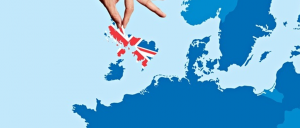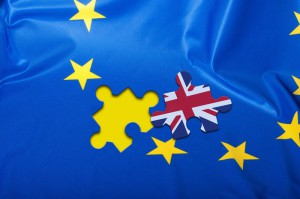Commercial considerations should drive Brexit negotiations.
The other day I was at a meeting of “experts” in several fields where we were discussing Brexit “what ifs”. I was just pleased to be considered an expert but finally found my voice had had my say!
![]() There was a lot of angst about the red-tape that will be imposed upon British businesses when the U.K. inevitably leaves the single market. The cost of doing business with the EU could become prohibitive. This would be especially true for SME’s.
There was a lot of angst about the red-tape that will be imposed upon British businesses when the U.K. inevitably leaves the single market. The cost of doing business with the EU could become prohibitive. This would be especially true for SME’s.
The threat of exclusion from the single market is a double-edged sword. In my view, the commercial interests of businesses within the EU that sell goods in the U.K. will have to be considered when the twenty-seven individual states set out their bargaining stance.
It is interesting that those “practitioners” who look at trade from a more technical perspective as opposed to those more involved in the nuts and bolts of selling see it differently.
Their view is that Global Trade is far bigger than what the EU does with the U.K. and they can quote numbers; always a telling factor. Be that as it may, if I am Mr Volkswagen, Mr. Neff or Mr. Blaupunkt and I am selling loads of stuff into the U.K., I am going to tell Mrs Merkel not to “queer my pitch” or whatever the Teutonic equivalent of that expression is or her 18% poll lead may start to dwindle.
Ben Broadbent the Deputy Governor of the Bank of England for Monetary Policy said recently, “should Brexit lead to a “significant curtailment” of Britain and the EU’s trading relationship, both parties would see considerable damage.” He did go on to say that it would be worse for the U.K. than for the EU but that is hardly the point!
Seriously, Did the British know what they were voting for?
I am a veteran of the financial markets and even if I were a total fool (and I am sure that there are some out there who believe I am), forty years and something should have stuck in my brain.
Despite a new-found agnosticism towards Brexit I was one of those who considered remainers to be clutching at straws when they “cried foul” following the referendum and shouted from the rooftops that the voters had somehow been hoodwinked into voting leave.
I do now feel that remain were very badly organized and simply believed that there was no way the country would vote leave.
 The “I don’t want my life to be ruled by Brussels” and “The next thing we will be having our interest rate set by Frankfurt” group were the “loudest voices” in the campaign egged on by Nigel Farage and his UKIP fanatics.
The “I don’t want my life to be ruled by Brussels” and “The next thing we will be having our interest rate set by Frankfurt” group were the “loudest voices” in the campaign egged on by Nigel Farage and his UKIP fanatics.
Migration is the major issue for the U.K. but what else about Brexit is? I am reminded of John Cleese’s character in “The Life of Brian”. “What has the EU ever done for us?”
The U.K. has been assailed by several immigrants from the EU at the same time as the Government is into a campaign of austerity that is cutting allocation of funds to public services.
The fact that Britains public services are stretched to breaking point to a significant extent counters the argument that most migrants from the EU are working and contributing to the economy. It is not a financial issue it is an issue of the capability of public services to cope. This whole situation is exacerbated by the fact that there are areas of the country where migrants congregate and this simply makes those areas into “Leave hotspots”.
Taking a balanced, middle of the road view coloured neither by pro or anti EU fanaticism, I now believe that there may be some truth to the argument that the public didn’t really appreciate what was going to happen.
We have already mentioned migration and the Brussels/Frankfurt thing. But, was Cameron so scared of UKIP that he couldn’t have made more of an effort to get a deal out of the EU. He said he did get a deal but that was just a ploy clearly.
The Twenty-Seven aren’t even ready for free movement; yet.
The time it has taken for the Eurozone to come anywhere close to one size fitting all is testament to this fact.
The social, financial and political upheaval it is causing is beyond compare. Free movement is a fallacy and has no place beside the other three freedoms. It may be possible in twenty, thirty or fifty years’ time but it is without doubt putting the cart before the horse to allow it now when there is still so much that is unequal about the Union.
 If we look at the furore that is being caused by the EU insisting that nations in the East, Hungary in particular, take a certain percentage of migrants, it is clear that they feel “this isn’t what we signed up for!”.
If we look at the furore that is being caused by the EU insisting that nations in the East, Hungary in particular, take a certain percentage of migrants, it is clear that they feel “this isn’t what we signed up for!”.
If Cameron had really tried to get a deal on free movement would the EU have listened? The arrogance of Messrs Tusk and Juncker and their take it or leave it attitude probably means they wouldn’t.
Issues over sovereignty are going to spring up all the time and they will have to be dealt with on a case by case basis. It should be easily understood that Britain is different to the rest of Europe when it comes to immigration. Most immigrants until twenty years ago were from the former colonies and the various aspects of that and the tensions it caused have gradually been eroded.
Look specifically at Poland and the EU’s threat over their High Court. The way in which the EU deals with issues amongst its members is simply not correct. Citing laws and governance is no way to deal with national problems.
With, respect, a Pole who comes to Britain earns a higher salary than he would at home but sends a large portion of that salary home. Thus, he is improving economic activity in Poland and “robbing” the U.K. of consumer spending. The same doesn’t happen in reverse. It should be agreed between Britain and Poland for example what the terms are of allowing joint migration.
Public services in the U.K. are lacking in investment it is true but they are also creaking under the weight of a population explosion that shouldn’t have happened for twenty or thirty years!
Rigidity, the path to a totalitarian state.
Is there a country or state on earth, or has there ever been one, that has survived for any length of time that has been as rigid in its application of its rules, conventions and treaties as the EU?
It has stealthily become Governed by non-elected officials and it is my contention that very few ordinary people really understand the role of its various offices, officials, Governing bodies and departments.
We all laugh at cucumbers that must be “practically straight”, water that doesn’t cure dehydration and eggs that cannot be sold by number (i.e. half a dozen) and should be weighed.
However, this masks a more sinister backstory!
If such crazy things can become law, what else can. It is not scaremongering to say that it is the thin end of the wedge.
The affiliation of nations needs to either become looser or tighter but it cannot stay the same. A looser affiliation would allow the individual members (they are all sovereign states after all) to agree bilateral treaties that allow for free movement between each to their mutual benefit.
Creating such a matrix, outside the governance or supervision of, but monitored by, the EU would have kept the U.K. within the EU.
A tighter affiliation would create a super state with common policies on every aspect of life (even including what side of the road we drive on!) It would need to be voted upon and have fewer political parties without national affiliations. Common defence, taxation, foreign policy, currency, and monetary policy would all provide a more unified Europe, but only if the people vote for it nation by nation.
There is far too little consultation of the populace within the current structure.
A Political football
If the musings of Sadiq Khan are to be believed, he is trying to lean Jeremy Corbyn towards a manifesto pledge to hold a second referendum on Brexit under the guise of obtaining the approval of the population for the deal that is eventually negotiated.
So, in his view, the U.K. goes through the whole procedure only to decide in the end that “actually we would rather like to stay in the EU since we don’t really like the exit terms we are able to achieve”
Britain and the Pound.
There is an innate nationalism about the U.K. even amongst those not born there. This is gradually being erased by immigrants from non-Commonwealth countries but that is an argument for another day!
 Overall the British like warm beer, The Royal Family, cricket and roast beef. But there’s one thing they cannot live without. The pound!
Overall the British like warm beer, The Royal Family, cricket and roast beef. But there’s one thing they cannot live without. The pound!
Had the Brexit referendum contained a clause about retention or otherwise of Sterling the leave vote would have been far higher! There are CFO’s and Finance Directors who openly state that commercially they would adopt the Euro. But Personally? Never.
At the meeting I mentioned above, one of the “what if’s” was “What is Brexit doesn’t happen?” I concluded that we would almost certainly be forced to give up the pound amongst all the other “harmonisations” that are coming.
There were howls of concern from even the most fervent Europhiles which just goes to prove my point.
















